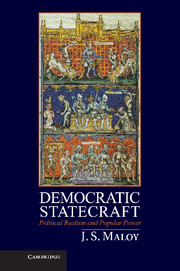2 - Reason of State and Realism’s Two Dimensions
Published online by Cambridge University Press: 05 March 2013
Summary
Moral, adjective. Conforming to a local and mutable standard of right; having the quality of general expediency.
Ambrose Bierce, The Devil’s DictionaryMoments of disillusion and despair can be as intellectually fruitful or practically useful as they are emotionally painful. This silver lining is one of the advantages held by people who acquire the habit of detached and scrutinizing thought, as well as a collective phenomenon with a distinguished historical lineage. In the Western tradition, the American Civil War and the First World War have often been seen as historical moments of this type, when grim experience laid the foundations for productive thought. Perhaps the religious wars of sixteenth-century Europe also deserve this recognition. The Reason of State theory that flourished after 1572, in the wake of the St. Bartholomew’s Day massacre, was arguably pivotal in Western intellectual history; at the very least, it can help us to understand what political realism is about.
The practical circumstances under which Reason of State developed make it a body of thought worth knowing about today. These circumstances included the geographic expansion of travel and commerce, revealing the diversity of human cultures – long before middle-class Americans thanked “globalization” for tropical spring break vacations. There was the genuine threat of a single military and political hegemon over the whole world in the form of the Spanish monarchy – not so different from, though slightly more credible than, the United States’ pretensions as “sole superpower” now. There was of course endemic religious warfare, both within and across national boundaries – a recent feature not only of the international “wars on terror” but also within partially modernized societies like Lebanon and Ireland.
- Type
- Chapter
- Information
- Democratic StatecraftPolitical Realism and Popular Power, pp. 12 - 41Publisher: Cambridge University PressPrint publication year: 2013



